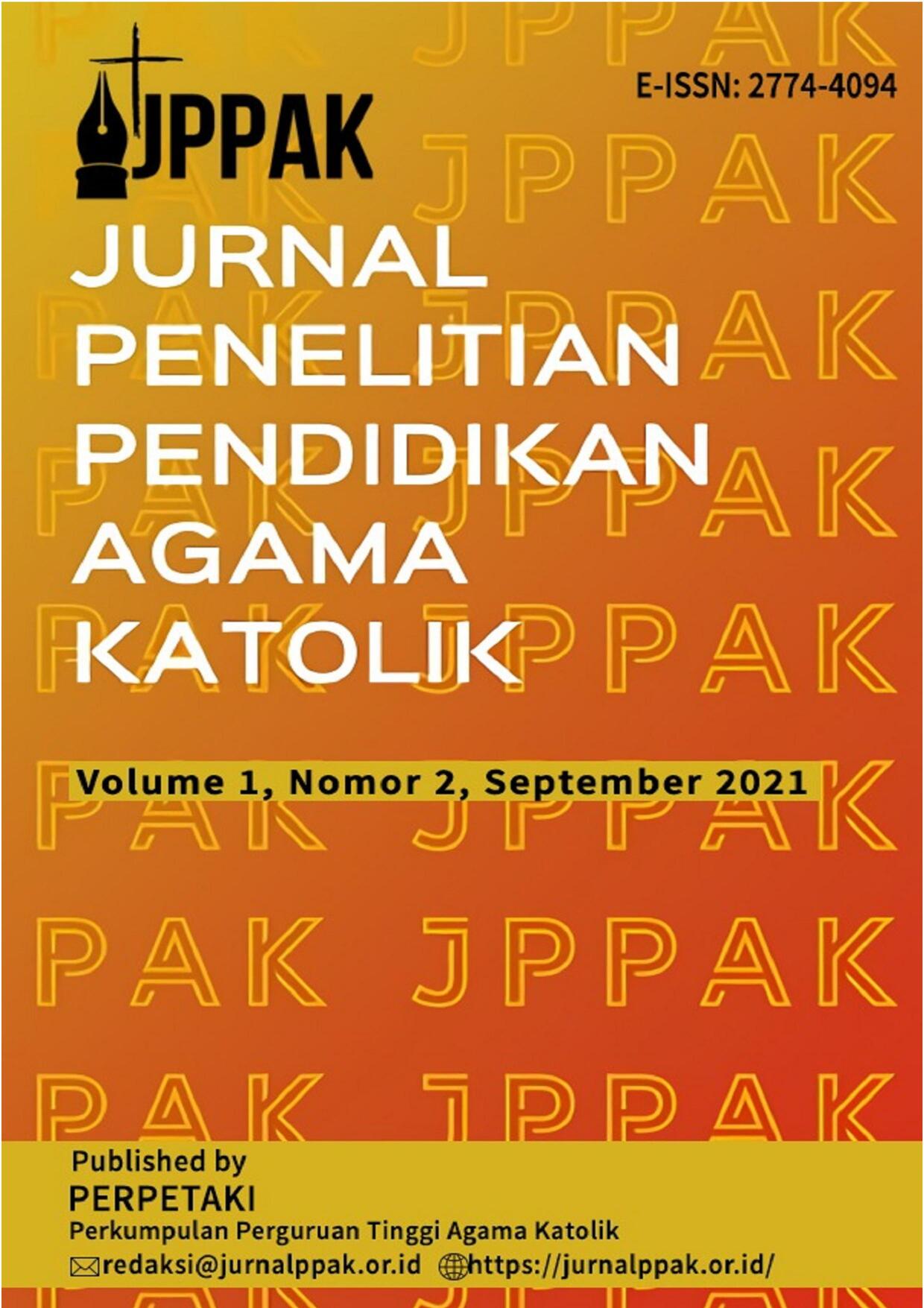Konstruksi Model Spiritualitas Pastoral bagi Katekis di Era Digital
DOI:
https://doi.org/10.52110/jppak.v1i2.31Kata Kunci:
Model Spiritualitas, Katekis, Era DigitalAbstrak
Artikel ini bertujuan untuk membangun model spiritualitas pastoral yang cocok untuk para katekis dalam era digital. Hal ini penting supaya para katekis memiliki semangat dalam melayani umat melalui berbagai media teknologi yang berkembang saat ini. Katekis merupakan sebutan untuk mereka yang terlibat dalam karya pewartaan dan pendamping yang dilakukan kepada umat. Agar pewartaan dan karya pastoral berdaya guna, mereka memerlukan cara menghadirkan diri secara baru. Penulis melakukan penelitian ini berupaya untuk membentuk model spiritualitas pastoral bagi para katekis di era digital. Penelitian ini menggunakan jenis penelitian kualitatif dengan metode dokumentasi. Pengumpulan data dalam penelitian ini dilakukan dengan mencari dan membaca dokumen-dokumen dan tulisan-tulisan yang memiliki keterkaitan dengan tema. Selanjutnya ada proses analisis dan interpretasi data. Berdasarkan hasil penelitian ditemukan bahwa era digital membawa peluang dan tantangan bagi para katekis. Dari berbagai tantangan yang ada di era digital ditemukan dua model spiritualitas yang cocok untuk diterapkan, yaitu spiritualitas pastoral inkarnatoris dan keugaharian. Kedua model spiritualitas ini dapat diterapkan dalam pewartaan dan pendampingan yang dilakukan oleh para katekis, sehingga pewartaan mengenai kerajaan Allah semakin dipahami oleh umat. Selain itu, berkat semangat inkarnatoris dan keugaharian, katekis dapat membantu umat untuk semakin mengenal Allah hingga membuatnya semakin berharap dan mengimani Allah.
Unduhan
##submission.downloads##
Telah diserahkan
##submissions.accepted##
Diterbitkan
Cara Mengutip
Terbitan
Bagian
Lisensi
Hak Cipta (c) 2021 Jurnal Penelitian Pendidikan Agama Katolik

Artikel ini berlisensi Creative Commons Attribution 4.0 International License.
Pernyataan tentang Hak Cipta dan Izin
Jurnal Penelitian Pendidikan Agama Katolik (JPPAK) mengizinkan secara langsung akses terbuka atas seluruh isinya berdasarkan prinsip mau menjadikan riset-riset terbuka bagi umum, terutama insan cendekia, untuk mendukung perkembangan ilmu pengetahuan yang lebih cepat dan terbuka secara global. Jurnal ini mendorong semua penulis ilmiah untuk mengizinkan hasil riset mereka untuk tersedia secara terbuka, gratis, dan tanpa pembatasan waktu.
Semua artikel dipublikasikan secara Open Access sehingga secara serta-merta dan permanen menjadi gratis untuk dibaca dan diunggah semua orang. Namun, berdasarkan lisensi CC BY-SA 4.0, setiap penulis atau author tetap menjadi pemilik hak cipta dari artikel masing-masing, dengan tetap memberi izin bagi yang lain untuk menggunakan isi dari artikel yang bersangkutan dalam JPPAK secara sebagian atau seluruhnya asal disitasi secara benar. Para pengguna JPPAK diharuskan untuk mensitasi sumber asli dengan mencantumkan sekurang-kurangnya: judul lengkap artikel, nama lengkap pengarang(-pengarang), JPPAK sebagai nama jurnal yang mempublikasi artikel, tahun penulisan, dan nomor edisi, dengan menggunakan metode sitasi yang wajar.
Hak Cipta mencakup hak eksklusif untuk menggandakan dan mempublikasi artikel ybs. dalam segala bentuk media, termasuk cetak ulang, foto, mikrofilm, atau cara reproduksi yang lain, termasuk terjemahan. Segala bentuk reproduksi dari jurnal ini, sebagian ataupun keseluruhan, penyimpanannya dalam database, serta penyebaran fotokopi, hasil pindai, rekaman, media magnetik dalam segala bentuk media, baik elektronik, elektrostatik dan mekanis harus mengikuti ketentuan lisensi yang disebutkan di bawah ini.
Jurnal Penelitian Pendidikan Agama Katolik (JPPAK) berlisensi Creative Commons Attribution Share-Alike 4.0 International. (CC BY-SA 4.0)
Setiap penulis yang mempublikasikan artikelnya dalam JPPAK setuju dan sepakat untuk mengikuti ketentuan-ketentuan sebagai berikut:
- Para penulis tetap memiliki Hak Cipta atas artikelnya, namun memberikan izin kepada JPPAK sebagai penerbit pertama dan pada waktu yang bersamaan meletakkannya di bawah lisensi Creative Commons Attribution Share-Alike 4.0 International (CC BY-SA 4.0) yang memberikan izin kepada yang lain untuk membagikan karya yanga bersangkutan dengan pengakuan karya penulis dan penerbitan pertamanya dalam jurnal ini.
- Para penulis diizinkan untuk mengadakan kontrak atau kesepakatan terpisah untuk suatu bentuk distribusi lain (misalnya, repositori institusi tertentu atau bagian dari buku tertentu), sejauh mencantumkan JPPAK sebagai tempat pertama publikasi.
- Para penulis diizinkan dan didorong untuk mempublikasikan karyanya secara daring (misalnya, lewat repositori institusi atau situs masing-masing) Authors are permitted and encouraged to post their work online (e.g., in institutional repositories or on their website) setelah publikasi dalam JPPAK, karena dengan demikian pertukaran dan perkembangan ilmu dapat terjadi secara lebih produktif. Demikian juga hal ini akan mendorong sitasi yang lebih awal dan lebih banyak (lih. The Effect of Open Access).












